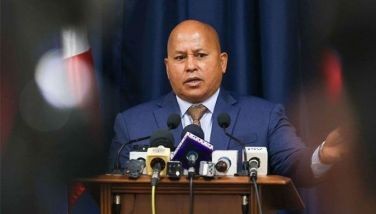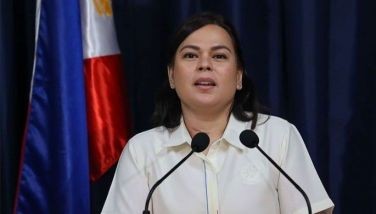Defense ready for final arguments
MANILA, Philippines - Defense lawyers of Chief Justice Renato Corona are ready for their final arguments before the Senate impeachment court today, and will focus on his admission that he had maintained around $2.4 million and at least P80 million in bank accounts.
They argued the admission should not be considered a high crime and enough reason for his conviction by the impeachment court.
Lead defense counsel Serafin Cuevas and senior counsel Eduardo de los Angeles will deliver before the Senate impeachment court their final arguments on why Corona should be allowed to stay as chief magistrate.
Corona’s spokesman Rico Paolo Quicho said the defense’s main argument will zero in on Article 2, which is primarily the issue of Corona’s supposed betrayal of public trust and violation of the Constitution for excluding certain assets in his statements of assets, liabilities and net worth (SALNs).
Corona is also facing Article 3, which questions his competence, integrity, probity and independence, as well as Article 7 on his alleged partiality to former President and now Pampanga Rep. Gloria Macapagal-Arroyo.
When Corona testified that he had started investing in dollars since the 1970s, his lawyers deemed to have the issue explained that the Chief Justice has no illegal wealth.
While Article 2.4 on the issue of illegal wealth was struck out during the early stages of the trial, Quicho said Corona had to mention that his family was involved in investing in foreign currency because it is more stable compared to other cash investments.
“There was no allegation of illegal wealth, we deemed to discuss it to rise to the challenge of transparency,” Quicho said.
Corona had admitted he had $2.4 million and P80.7 million in bank accounts, but these are “co-mingled” with the family corporation of his wife, the Basa-Guidote Enterprises Inc. (BGEI), and that of his children. The peso accounts also included funds from his mother.
“These funds were at his disposal, not in his ownership; he is holding them only in trust,” Quicho said.
While the defense team expressed belief that they had provided Corona all the legal strategies he needed and outlined them for his possible acquittal, Quicho admitted the impeachment issue is also political in nature.
While the defense presented a “strong” legal argument, Quicho said there are other factors that surround the proceedings like politics and public opinion.
“If you talk about the legal side, we are very confident. But you have to take in the general picture,” he said.
“We cannot really control that… the political issue they have to confront now is their own transparency and accountability in their own bank accounts,” Quicho said.
Quicho said Corona’s critics have resorted to rumors, intrigues and accusations to sway public opinion against Corona.
“We are being overwhelmed not by evidence but insinuations and rumors raised by the prosecution,” he said.
‘Turn the tide’
Corona’s camp expressed belief that the Chief Justice’s signing of the waiver of his bank accounts has “turned the tide” against the prosecutors “because they have not risen up to the challenge of transparency and accountability.”
“They even had the chance to check further on his testimony (on bank accounts) but they did not do it,” Quicho said, referring to the prosecution.
“The truth is the accounts will bury their unfounded allegation (that Corona had 82 accounts), and that they cannot face the clamor to open up their own bank accounts to the public,” Quicho added.
Quicho said Corona gained “moral high ground” when he agreed to sign an unconditional waiver on his bank accounts.
“Because of his (Corona’s) testimony and waiver, he has moral high ground,” Quicho said in a phone interview yesterday.
“The Chief Justice called for transparency and accountability. He raised the bar for transparency,” he added.
Quicho noted though that many of Corona’s critics did not follow Corona’s example.
Quicho said he is “eagerly waiting” if lead prosecutor Iloilo Rep. Niel Tupas Jr. would be brave enough to accept the challenge to issue a waiver on his bank accounts.
He debunked Tupas’ statement that he is not the one on trial but Corona.
“After Tuesday, they (complainants) will be on trial whether they will be rising up to the clamor for transparency and accountability,” Quicho said. “This is the issue that they have to confront.”
While the prosecution believes Corona’s appearance before the impeachment court harmed his case, the defense panel thinks otherwise.
“The direct communication of the Chief Justice and the signing of the waiver turned the tide (in favor of the defense panel),” Quicho said.
Last Tuesday, Corona brought out a prepared waiver and signed it before the impeachment court. The waiver would allow banks to release information about Corona’s accounts.
‘No obligation to declare’
Corona said he was signing the waiver even if he was under no obligation to execute it since he was protected by the Foreign Currency Deposit Act, which provides for absolute confidentiality of dollar deposits.
He also allowed the Bureau of Internal Revenue, Anti-Money Laundering Council, Securities and Exchange Commission, and the Land Registration Authority to disclose all information that may show his SALN, business interests and financial connections.
Corona, however, asked all 188 complainants from the House of Representatives and Sen. Franklin Drilon to also sign a waiver.
“If you decline, then you will affirm to me and all who are watching that there is in fact no legal obligation or duty to disclose foreign currency holdings and deposits,” he added.
Upon his return to the witness stand last Friday, Corona submitted an unconditional waiver on his bank accounts, saying he would no longer wait for the 189 lawmakers to do the same.
The prosecution panel, however, claimed that Corona’s unconditional waiver was too little, too late.
“We think it’s really too late in the day. I mean if he wanted to be transparent, he should have done so when the prosecution was still presenting its evidence,” Marikina Rep. Romero Quimbo said in a press briefing last Friday.
Corona’s prosecutors also believe that the move was intended to delay the proceedings.
Corona’s lawyers, however, remained confident that the Chief Justice would get an acquittal once the impeachment court hears the final arguments of the defense and prosecution panel today.
“He (Corona) had admitted that he had accounts in both dollars and pesos, but this does not mean that he is guilty (of the Articles of Impeachment). Under the law, he has no legal obligation to declare the dollar accounts,” Quicho said.
Echoing a senator-judge’s argument that Republic Act 6426 or the Foreign Currency Deposit Act is a special law, Quicho said the law should be interpreted “in harmony” with the Constitution.
“It need not be contradictory but it should amplify (the Constitution)… if the Senate, sitting as an impeachment court, and the prosecution thinks there is a problem, then (Congress) should amend the law, not impeach it,” Quicho said.
“The specific provision of the foreign currency law prevails over the general law which is the Constitution,” he said.
“That is how the Chief Justice interpreted the law, only the Supreme Court can decide on the applicability of the laws,” Quicho said.
According to Quicho, no less than the prosecution’s witness, Supreme Court clerk of court Enriqueta Vidal, testified that Corona had “disclosed” his SALNs from 2002 to 2010.
When Sen. Franklin Drilon asked Vidal if she had copies of Corona’s SALN, the SC official reluctantly turned over the copies of the chief magistrate’s SALN to the impeachment court.
“So as to the issue of disclosure, the CJ (Chief Justice) disclosed them,” Quicho said.
Vidal had argued that SALNs of court executives are covered by a department order that limits the automatic revelation of SALNs to the public. Prior permission is needed through a resolution, Vidal said.
Only five properties
As for Article 2.3, which deals with alleged properties and bank accounts not included in Corona’s SALNs, Quicho said the legal basis had been propounded as to why condominium units in The Bellagio and Bonifacio Ridge were not declared outright in the year the Corona couple supposedly started purchasing the properties.
“There was no actual delivery at that time, therefore, there is no possession, and it is not incumbent for the Chief Justice to declare them. But they were declared in subsequent years,” Quicho said.
“We strongly feel that the issue on the properties is a foregone conclusion,” Quicho said.
He noted that Corona’s relative, Demetrio Vicente, had debunked claims that Mrs. Corona still owned a 3,400-square-meter property in Marikina City.
The defense panel had also destroyed the prosecution’s claims that Corona had actually 45 properties. He only had five properties as correctly declared in his SALN as of 2010.
As for Corona’s admission on P80 million in bank accounts, Quicho reiterated the chief magistrate was holding it in trust.
“He does not consider it as his property, so he need not declared it. He was holding it in trust for the BGEI and his family members,” he argued.
– Christina Mendez, Alexis Romero
- Latest
- Trending






























